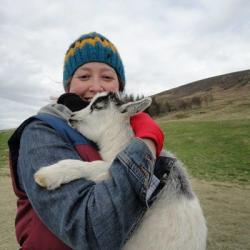Edward Weinman spent eight years as a freelance journalist in Iceland, or rather, he “endur[ed] many long, dark, cold, windy, grey winters” during which he “suffered only one nervous breakdown.” It is apparently lucky that he escaped the country when he did because according to his portrayal of Iceland in ‘The Ring Road’—a “Scando crime thriller” and “dark fantasy” by his own reckoning—this is a truly dangerous and horrible place, one in which the threat of sexual assault is ever-present, where if the constant darkness doesn’t “finally break” you, the constant light will, and where death and disfigurement take myriad creative forms, threatening locals and travellers alike with scalding showers, wild animal attacks, and of course, volcanic eruptions.
The novel opens, Columbo-style, on the murderer: a lonely farmer who rapes and then accidentally kills a stripper. The clumsy killer is not without his human side, though: like Job, he’s suffered the consecutive losses of everyone he loves, leaving him with no one to talk to but his loyal dog, Halldór Laxness. This murder sets a deranged pimp off on a vengeance quest and also coincides with the arrival of Hobson, an American ex-cop, who stops-over in Reykjavík on his way to Europe to heal wounds wrought by his own grim past. But then a volcanic eruption strands Hobson, and he finds himself circumnavigating the country with a group of hapless tourists who each fall prey to the terrors of Iceland, such as one-eyed witches and herds of man-eating swine.
In the last third or so of the novel, the absurdity of the aforementioned terrors hits such a fever pitch that you can actually, briefly, enjoy yourself: there is a deus ex polar bear that earns a chuckle, and Edward imagines a fittingly epic role in his post-apocalyptic Bizarro-Iceland for the crocodiles that Húsavík mayor Reinhard Reynisson sought to import for waste-disposal purposes in 2010.
Unfortunately, Edward hasn’t really written an alternate-reality, absurdist thriller-comedy about Iceland. If that were the case, his portrayal of the country could be read as farce and could be enjoyed in the spirit of a Carl Hiaasen Everglade caper. But Edward is gunning for credibility: he’s lived here, and obviously thinks he got to know the “real” Iceland, as the reader will surely be convinced of by his references to The Blue Lagoon, Prikið, deCode, and, oddly, www.vedur.is.
It is presumably on the strength of his copious insights into Iceland that Edward offers up frequent narratorial voice-overs in which he declaims assessments about the country which range from the facetious to the patently offensive. The best example of the latter is found in the novel’s very first sentence, which declares that “[s]ince Iceland’s lesbian prime minister outlawed strip clubs, women living in rural towns have begun…double-checking to make sure their front doors are securely locked.” The logic of this statement follows in a page-long scree, which is trotted out at regular intervals, and with more than one reference to the prime minister’s sexual orientation throughout the novel: with no strip clubs left for randy farmers and lusty sailors to relieve their tensions, these men have no alternative but to rape women (the lack of strip clubs is also blamed for the existence of prostitution in Iceland).
There have been an average of two murders a year in Iceland for the last three decades. Given this, the sheer volume of violent deaths in this purportedly “serious” crime novel just seems silly (there are at least six murders in the novel and nature dispatches countless others). Of course Iceland, like any country, has its share of violent crime, if not much of it. And yes, the weather is unpredictable and often deadly, the winter days are very short, there are all sorts of kooky characters living here, and periodically, there are volcanic eruptions, although the only people killed in the Eyjafjallajökull eruption in 2010 were a few tourists who got lost while trying to find a good vantage point to watch it from.
There’s nothing to prevent someone from writing a crime novel set in Iceland that deals with serious issues such as prostitution or domestic abuse or sexual assault or financial intrigue or murder. These topics and more have been successfully taken up by many Icelandic and foreign crime authors alike. ‘The Ring Road’s’ missteps (aside from its rampant misogyny, which we haven’t even touched on here) lie not in saying mean things about Iceland, but in not bothering to take its setting or its characters at all seriously. Rather, it delights in exoticizing Iceland, in portraying it as a place of ridiculous extremes, “a country so inhospitable that instead of nurturing its inhabitants it punishes them.”
Buy subscriptions, t-shirts and more from our shop right here!
















